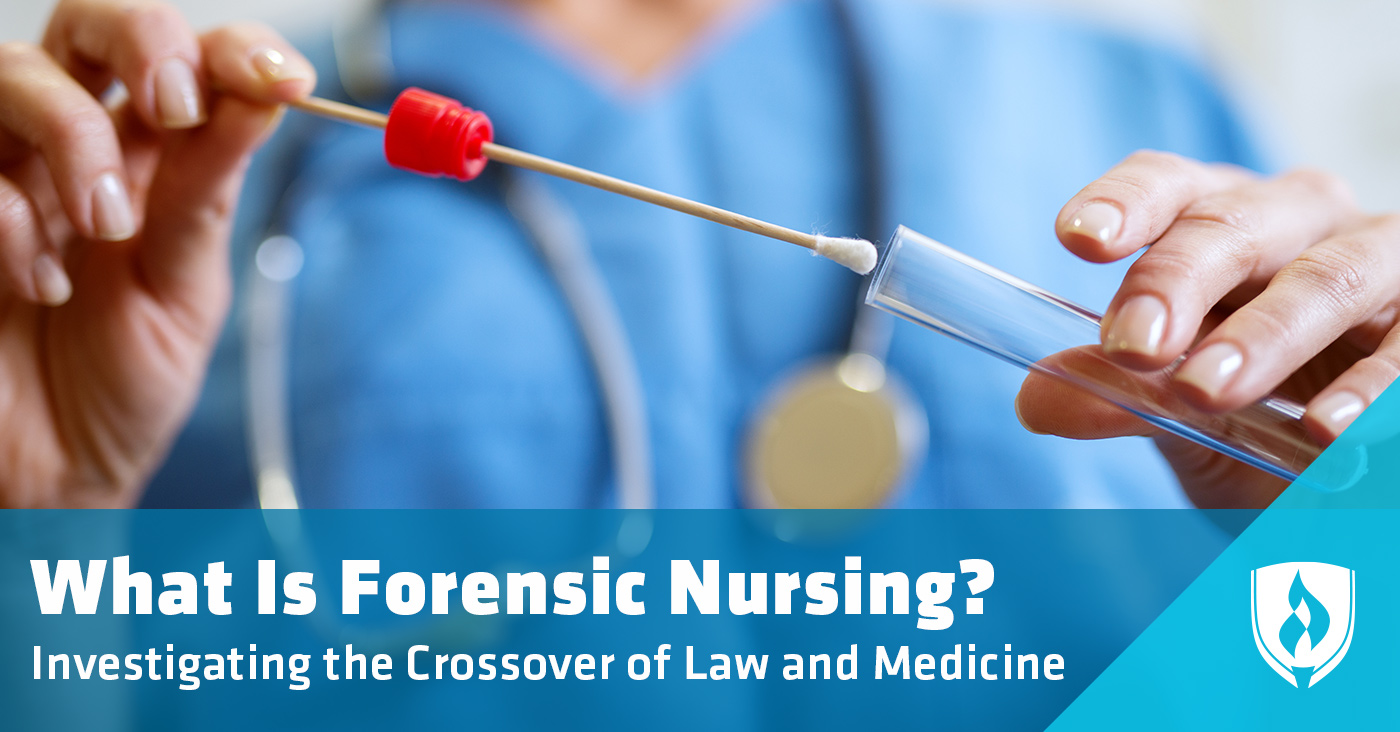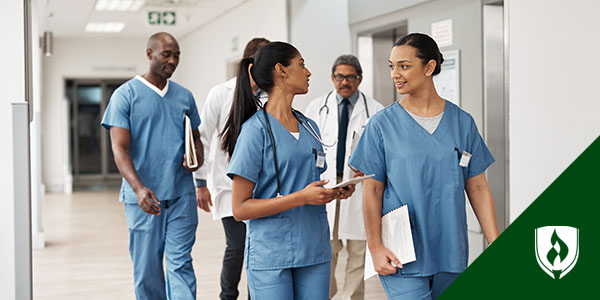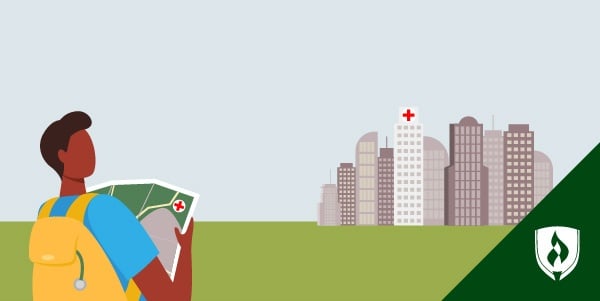What Is Forensic Nursing? Investigating the Crossover of Law and Medicine
By Kirsten Slyter on 10/15/2018

Some of the most exhilarating cases to follow are those in which the judge and the jury can come to a firm conclusion based on DNA or some other physical evidence, giving the victim and the public the justice and closure they seek. Forensic nurses are often the people who first encounter that physical evidence, whether it’s a DNA swab, blood or urine sample, clothing or any other items.
While that itself is an amazing part of their work, forensic nurses do so much more. In this article, we’ll take a closer look at what forensic nursing is, and explain how this important work overlaps with law enforcement professionals.
Get Your Nursing School Questions Answered at a Nursing Information Session
What is forensic nursing?
Forensic nursing sits firmly at the intersection of medicine, science and law. Kristi Jarvis, a forensic nurse and the forensic program coordinator for the Hennepin County assault response team, describes it as “A specialized area of nursing that focuses on all individuals affected by violence, which may include sexual violence, intimate partner violence, child abuse, gunshot wounds and physical assault.”
Forensic nurses may also work in areas you might not initially think of, like in prisons as part of a correctional nursing team. You’ll also find forensic nurses in the aftermath of mass disasters providing trauma nursing and death investigation. These nurses are vital to both the care of victims and the effectiveness of law enforcement in violent crimes.
How do forensic nurses work with law enforcement?
Though not every victim of violence chooses to report their experience to law enforcement when they have a medical-forensic exam done, many ultimately do. This is where forensic nurses usually step in and contact law enforcement so the authorities can take the victim’s report before they are discharged. Any evidence collected during the exam is turned over to law enforcement. In cases of suspected or confirmed abuse, forensic nurses, like all nurses, are mandated reporters, and must reach out to child or adult protective services.
Jarvis notes that in her county, the forensic nurses have developed such a strong and collaborative working relationship with law enforcement that the authorities will often reach out to the forensic nurses for consultation on the interpretation of the injuries with the reported assault.
Forensic nurses can also serve as an expert witness in court and, if experienced enough, provide judicial recommendations. This mostly happens in cases of domestic violence, sexual assault, child abuse, elder mistreatment and death investigations.
Forensic nurses also do preventative work, serving the community and working with local government and law enforcement by educating the public about signs of assault or danger and what to do about it. This can include holding information sessions at schools, workplaces or public forums. Amy Schmitz, the lead nurse for the Allina Health Forensic Program, travels to police departments and gives short presentations about what forensic nurses do and how they can work together.
What types of things do forensic nurses typically do?
The duties of a forensic nurse vary widely and depend very much on the position and setting. Most forensic nursing duties typically look like this:
- Providing one-on-one, trauma-informed care to patients reporting violence.
- Reporting suspected or confirmed abuse to authorities.
- Completing medical-forensic examinations (documenting injuries, collecting DNA samples and other materials that may influence an investigation).
- Sending samples and documentation to law enforcement, if requested.
- Evaluating and treating patient for STIs or pregnancy.
- Giving testimony in a court of law, typically on behalf of prosecutors.
- Acting as a resource for anti-violence efforts, educating the public and law enforcement community.
Where do forensic nurses work?
Because forensic nursing is not a separate entity, but is integrated into the overall care needs of individual patients, forensic nurses work in many common healthcare institutions—most often in hospitals.
In hospitals or clinical settings, forensic nurses often work as part of a multidisciplinary team that includes emergency department staff, child and adult protection advocates, law enforcement and prosecutors. The amount of work depends on how much need there is. For instance, Schmitz’s team is responsible for covering 10 hospitals, which requires her team to work “on-call” to meet varied demand. A patient in need of a medical forensic exam can arrive at any time, so forensic nurses who are on call need to be prepared to arrive as soon as possible. Schmitz says she doesn’t know who she’s going to meet when her pager goes off, but she’s prepared for anything.
“It doesn’t matter if the call is in the middle of the night during a blizzard—I’m on my way,” Schmitz says.
It’s very rare that a forensic nurse works in an environment with focus on the non-sexual violence, according to the International Association of Forensic Nurses (IAFC). Nurses that do can become certified as Sexual Assault Nurse Examiners (SANES) with two years or nursing experience, training and certification. Those that don’t work in that field, might work in the following settings:
- Medical examiner’s or coroner’s office: Called forensic nurse investigators, they examine the crime scene and the body.
- Nursing homes or senior living facilities: Forensic gerontology specialists help investigate cases involving abuse or neglect of elders.
- Aftermath of mass disasters: In disaster zones, forensic nurses provide much-needed trauma and emergency nursing, mental health stress management, death investigation and management of infectious diseases.
Before getting your heart set on a particular path, it’s important to note that every state’s board of nursing has its own set of practice standards, which could impact what settings forensic nurses are allowed to practice in.
What characteristics make for a good forensic nurse?
Being a forensic nurse is immensely challenging, but those with these characteristics might find this position massively rewarding:
- Critical thinking: The victims’ problems go much deeper than just physical injury or pain. Though there may be little sign of physical injury, in some cases, forensic nurses must be able to preemptively address mental health issues as well. Jarvis notes that forensic nurses often work autonomously and must use critical thinking to decide on the next best steps in an exam.
- A strong sense of self: Many helpers who work with those affected by trauma often experience a sort of secondhand trauma themselves, also called vicarious traumatization. Characterized by a lack of personal meaning and hope, it can affect the trauma helper’s marriage, mental health, children and friendships.Having a support system, a strong belief system and effective and healthy coping strategies can help forensic nurses immensely in maintaining their ability to have empathy daily for their patients and continue to be an advocate for them.
- Individualization: Each person reacts differently to trauma and a forensic nurse has to be sensitive to each patient’s state. Schmitz loves this aspect of the job. Each patient gets her “Undivided and full attention in a way that is rare in nursing.”
Above having empathy, being detailed-oriented and skilled at multitasking, Jarvis also cites passion for this type of work is the most important.
“This work is not for everyone, and it takes a particular type of person to do it,” Jarvis says.
How do I become a forensic nurse?
First and foremost, you’ll need to become a registered nurse by earning either an Associate’s degree in Nursing or a Bachelor of Science in Nursing and passing the NCLEX-RN exam. After that, you’ll need about two years of nursing experience. Most nurses interested in forensics spend time in the emergency department, the ICU, OB/GYN or psychology and mental health units.
After two years of nursing experience, you can complete a 40-hour SANE course with an adult/adolescent or pediatric focus, or both. Those interested in becoming a forensic nurse investigator can earn a certification through the American Board of Medicolegal Death Investigators. Keep in mind that some states may require you to be an Advanced Practice RN for certain workplaces..
Many webinars and educational resources also exist to help forensic nurses gain knowledge and advance their careers including those offered by:
- Tribal Forensic Healthcare Online
- International Association of Forensic Nurses
- End Violence Against Women International
- Strangulation Training Prevention Institute
Those interested in the field can also subscribe to Forensic Healthcare Online or the IAFC to keep up-to-date on the latest happenings in the world of forensic nursing.
Why is being a forensic nurse rewarding?
Though being a forensic nurse can be emotionally challenging and can require additional training, many in the field find it extremely rewarding. Jarvis describes it as an incredible honor to work with and help individuals and often their loved ones on what may be the worst day of their lives.
It’s imperative that the patient see themselves as more than just a victim and realize that their experience does not define them. Getting to be the person who tells them that for the first time is incredible, Jarvis said. “It makes you feel as though you are truly making a difference.”
Take the first step
A career in forensic nursing provides a unique blend of compassionate care and clinical investigation. If a career spent helping victims of violence bring their attackers to justice sounds like it’d be a great fit for you, your first step will be getting established as a registered nurse. Our article, “How to Become a Registered Nurse: Your 4-Step Guide, ” lays out the steps you’ll need to take to make that happen.
Related Articles:


.png)

